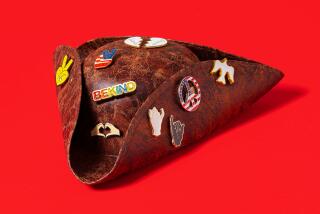Commentary: They should have called the ‘Friends’ reunion ‘The One Where They Ignored Diversity’
- Share via
Fans of the beloved sitcom “Friends” who have been clamoring for a cast reunion for years are dancing in the streets and in their living rooms today: Ross, Rachel, Monica, Chandler, Joey and Phoebe are finally back together in HBO Max’s “Friends: The Reunion.”
But it’s not a moment of celebration for everyone.
Although legions of “Friends” devotees are ecstatic right now, there are plenty of others who might instead subtitle the reunion: “The One Where They Ignored Diversity — Again.”
At a time when the television landscape is becoming increasingly diverse and inclusive, it’s uncomfortable — if not outright inappropriate — to raise a glass to a sitcom that was so blind to the multiculturalism of the world where it took place. It’s a conversation that was already happening when the series, which premiered in 1994, marked its 25th anniversary in 2019. Which makes the failure to confront the subject head-on in the long-delayed special, appearing a year after the murder of George Floyd sparked massive protests against police brutality and amid the ongoing conversation about race relations and white supremacy in this country, all the more glaring.
There’s little question about the enduring love for “Friends” in popular culture, an affection that is well-deserved. The show, from cocreators Marta Kauffman and David Crane and executive producer Kevin S. Bright, was consistently funny. The chemistry was off the charts. And it offered a highly relatable portrait of the ups, downs and side trips that can happen among a tribe of close-knit friends.
In the 17 years since it went off the air, there have been countless offers to revive ‘Friends’ in one way or another. Here’s why it came together now.
But the series was also consistently criticized for all but ignoring people of color during its 10-season run. (It’s also been called out for being homophobic and transphobic.) Astute observers wondered how a contemporary series set amid the diversity of New York City could be so glaringly, near completely white.
Besides a few background performers seen here and there in the Central Perk coffee shop where the gang hung out, nonwhite characters on “Friends” were few and far between. The cavalcade of guest stars included such actors of color as Lauren Tom, Gabrielle Union, Mark Consuelos and Craig Robinson, though their interactions with the main cast were mostly brief.
Most famously — and awkwardly — the series attempted to address the situation in 2003 when Aisha Tyler appeared as a paleontology professor who worked with Ross (David Schwimmer) and eventually dated him — after first dating Joey (Matt LeBlanc). But after just nine episodes, her character was gone and the show retreated to its all-white comfort zone. (Tyler has since noted in interviews that the character was not written as a woman of color.)
Last year, during the broader cultural reckoning that came alongside Black Lives Matter protests and grief over police killings of unarmed Black people, Schwimmer, told “Entertainment Tonight” that it was “wrong” for the show not to embrace greater inclusion. “It just felt that there was not enough representation on the show.” He said he often lobbied for his character to date women of different races: “I really felt that Ross should date other people, women of all races.”
And Kauffman apologized for the show’s cultural shortcomings last year during a virtual ATX Festival panel about diversity in the writers’ room. “I wish I knew then what I know today,” she said. “I would have made very different decisions. We’ve always encouraged diversity in our company, but I didn’t do enough.”
But Kauffman’s apology is reflective of the doublespeak by many prominent figures in Hollywood, including executives, actors, directors and writers, when confronted with the underrepresentation of people of color in all aspects of the entertainment business.
The pair who immortalized the phrase ‘We were on a break!’ confirm their long-rumored attraction in ‘Friends: The Reunion,’ now streaming on HBO Max.
What Kauffman meant when she said “I wish I knew then what I know today” is unclear, given that “Friends” aired on the same network that programmed groundbreaking sitcoms like “The Cosby Show,” “A Different World” and “The Fresh Prince of Bel-Air” years before “Friends” debuted.
“Friends: The Reunion,” which filmed in April of this year after being postponed by the COVID-19 pandemic, offered a prime opportunity for the show to acknowledge its failure explicitly in a major forum, which might have resulted in a candid assessment of its legacy. After all, it’s clear that the benefits of diversity are apparent to the makers of the reunion special, which included a segment on the effect of “Friends” filled with queer fans and fans of color, and featured guests such as BTS, Malala Yousafzai and Mindy Kaling.
Yet an in-depth discussion about the casting process did not prompt any direct acknowledgment of the series’ lack of diversity, nor did the cast’s interview with host James Corden. In the midst of all the nostalgic good times, even a brief, frank exchange would have demonstrated an awareness that fans likely would have welcomed.
But like the show itself, the “Friends: The Reunion” is out of step with today’s world. It’s still plenty enjoyable and often funny, but it remains shadowed by the same old blind spot. And 17 years after the original ended, it’s a shortcoming that’s not all that easy to let go.
Times intern Angie Orellana Hernandez contributed to this report.
More to Read
The complete guide to home viewing
Get Screen Gab for everything about the TV shows and streaming movies everyone’s talking about.
You may occasionally receive promotional content from the Los Angeles Times.







